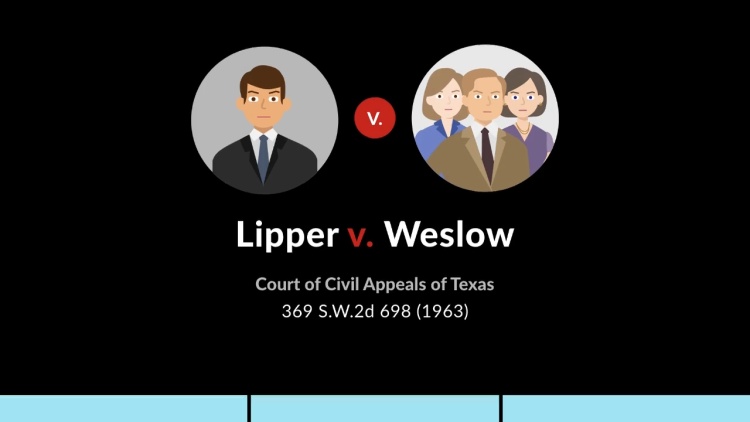Lipper v. Weslow
Texas Court of Civil Appeals
369 S.W.2d 698 (1963)

- Written by Christine Raino, JD
Facts
Sophie Block died at the age of 81, 22 days after executing her final will, which left her estate to her two children from a second marriage, Frank Lipper and Irene Lipper Dover (defendants), and disinherited her deceased son’s children, Julian Weslow, Jr., Julia Weslow Fortson, and Alice Weslow Sale (Weslows) (plaintiffs). Block’s son, Frank Lipper, an attorney and a beneficiary whose inheritance was increased by the exclusion of the Weslows as beneficiaries, drafted the will. Paragraph nine of the will explained that Block was disinheriting the Weslows because she had a distant and unpleasant relationship with her daughter-in-law and the Weslow grandchildren who did not visit her and infrequently sent her cards or flowers, while her children, Frank and Irene, took care of her and her husband who were in failing health. The Weslows challenged the will claiming undue influence by Frank Lipper. Evidence showed that Frank Lipper, in addition to drafting the disputed will, had a contentious relationship with his deceased half-brother who was the Weslows’ father. Additionally, evidence showed that Frank lived next door to Block and had a key to her house. The Weslows pointed to this evidence to assert that Frank had the motive and opportunity to intercept cards and flowers they sent to Block. The evidence also showed that the will was not read to Block before she signed and that the recitations of her reasons for disinheriting the Weslows contained inconsistencies. However, a witness testified that Block had told her of her intention to disinherit the Weslows a few years prior to execution of the will. Three other witnesses also testified that subsequent to executing her will, Block said she intended to disinherit the Weslows for reasons consistent with paragraph nine of her will. The jury returned a verdict in favor of the Weslows. Frank Lipper and Irene Lipper Dover appealed to the Texas Court of Civil Appeals.
Rule of Law
Issue
Holding and Reasoning (McDonald, C.J.)
What to do next…
Here's why 911,000 law students have relied on our case briefs:
- Written by law professors and practitioners, not other law students. 47,100 briefs, keyed to 997 casebooks. Top-notch customer support.
- The right amount of information, includes the facts, issues, rule of law, holding and reasoning, and any concurrences and dissents.
- Access in your classes, works on your mobile and tablet. Massive library of related video lessons and high quality multiple-choice questions.
- Easy to use, uniform format for every case brief. Written in plain English, not in legalese. Our briefs summarize and simplify; they don’t just repeat the court’s language.





